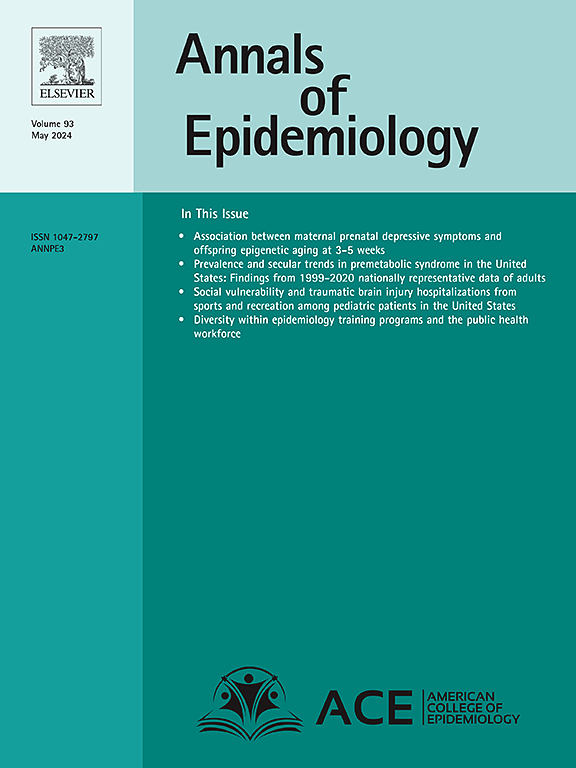吸烟与患有卵巢癌的黑人妇女生存的关系:来自非裔美国人癌症流行病学研究(AACES)的证据。
IF 3.3
3区 医学
Q1 PUBLIC, ENVIRONMENTAL & OCCUPATIONAL HEALTH
引用次数: 0
摘要
背景:大量的研究证明了吸烟对卵巢癌存活的负面影响,但这些先前研究的参与者主要是白人女性。相比之下,黑人女性的卵巢癌存活率明显较低,这可能部分归因于不同的风险因素概况或与生存相关的因素。因此,我们在一组患有卵巢癌的黑人妇女中研究了吸烟与生存之间的关系。方法:本研究纳入了基于多地点人群的非裔美国人癌症流行病学研究(AACES)的参与者,这是一项对592名患有上皮性卵巢癌的黑人女性的前瞻性队列研究,平均随访5.5年。Cox比例风险模型适合于估计吸烟状况(当前和曾经吸烟与从不吸烟)与调整了社会人口、生活方式和临床因素的全因死亡率之间的关系。结果:与从不吸烟的女性相比,目前吸烟的女性的生存率更差,但没有统计学意义(HR 1.41;95% CI 0.95- 2.10),而戒烟妇女的生存率相当(HR 1.06;95%可信区间0.82 - -1.35)。在前吸烟者中,过去五年内戒烟者与目前吸烟者的相关性相似(HR 1.37;(95%可信区间0.97-1.94),但在戒烟50年的人群中没有观察到风险。结论:目前吸烟的黑人上皮性卵巢癌患者的生存率低于从不吸烟的女性。尽管这种关联在统计上并不显著,但这种关联的程度与之前主要由白人女性组成的研究相似。确保获得基于证据的戒烟策略是降低患有卵巢癌的黑人妇女死亡率的潜在途径。本文章由计算机程序翻译,如有差异,请以英文原文为准。
Cigarette smoking in relation to survival in Black women with ovarian cancer: Evidence from the African American Cancer Epidemiology Study (AACES)
Background
Numerous studies have documented the negative impact of cigarette smoking on ovarian cancer survival, but the participants in these prior studies were predominantly White women. In comparison, Black women experience significantly worse ovarian cancer survival, which may be due in part to dissimilar risk factor profiles or factors associated with survival. We therefore examined the association between cigarette smoking and survival in a cohort of Black women with ovarian cancer.
Methods
This study included participants in the multi-site population-based African American Cancer Epidemiology Study (AACES), a prospective cohort study of 592 Black women with epithelial ovarian cancer followed up for an average of 5.5 years. Cox proportional hazards models were fit to estimate the association between cigarette smoking status (current and former smoking vs. never smoking) and all-cause mortality adjusting for sociodemographic, lifestyle, and clinical factors.
Results
Compared with women who never smoked cigarettes, women who currently smoked cigarettes experienced worse, but not statistically significant, survival (HR 1.41; 95 % CI 0.95– 2.10), whereas women who had quit smoking had comparable survival (HR 1.06; 95 %CI 0.82–1.35). Among former smokers, the association among those who quit smoking within the past five years was of similar magnitude as for current smoking (HR 1.37; 95 % CI 0.97–1.94) but no risk was observed among those who quit for > 5 years.
Conclusion
Black women with epithelial ovarian cancer who were current smokers experienced worse survival than those who never smoked cigarettes. Even though this association was not statistically significant, the magnitude of the association is similar to prior studies comprised predominantly of White women. Ensuring access to evidence-based smoking cessation strategies represents a potential avenue for reducing mortality in Black women with ovarian cancer.
求助全文
通过发布文献求助,成功后即可免费获取论文全文。
去求助
来源期刊

Annals of Epidemiology
医学-公共卫生、环境卫生与职业卫生
CiteScore
7.40
自引率
1.80%
发文量
207
审稿时长
59 days
期刊介绍:
The journal emphasizes the application of epidemiologic methods to issues that affect the distribution and determinants of human illness in diverse contexts. Its primary focus is on chronic and acute conditions of diverse etiologies and of major importance to clinical medicine, public health, and health care delivery.
 求助内容:
求助内容: 应助结果提醒方式:
应助结果提醒方式:


